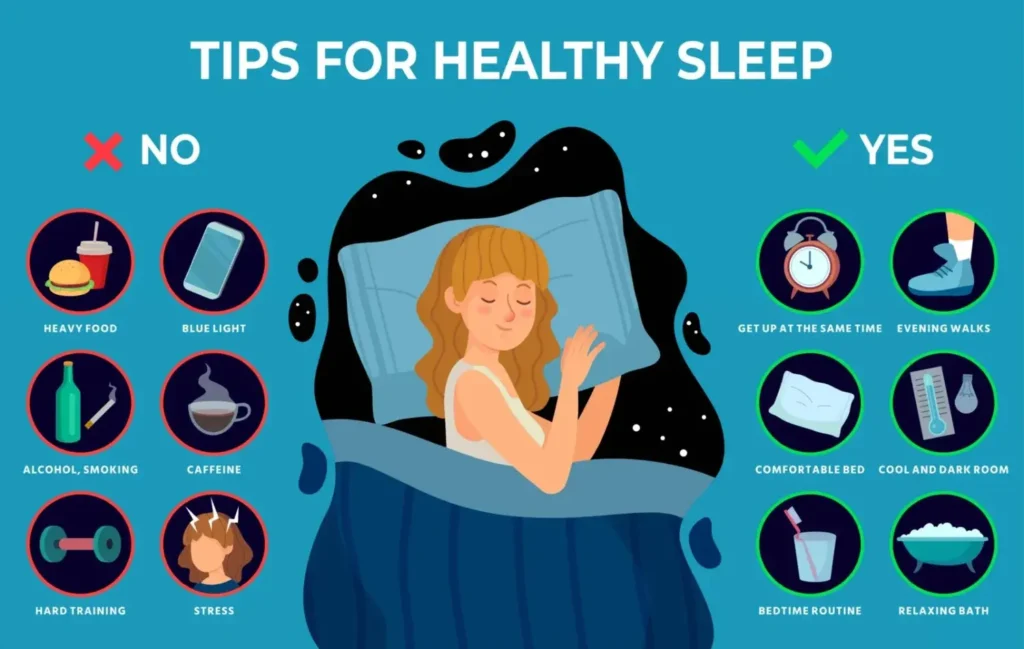WHAT ARE GOOD HABITS AS A STUDENT
It is essential for a longer and healthier life. Regular exercise, healthy eating, and quality sleep can greatly improve your life
Getting into good habits as a student is super important to do well. It helps them be more disciplined, on time, and smarter, etc.

Difference between good habits and bad habits for student
First off, let’s look at the differences between good and bad habits for students.
Good Habits
- Balanced diet
- Proper sleep
- Regular exercise
- Consistent learning
- Mindful meditation
Benefits:
- Enhance quality of life
- Improve focus
- Boost creativity
- Reduce stress
- Foster emotional well-being
Poor Habits
- Lack of physical activity
- Frequent consumption of junk food
- Excessive screen time
- Procrastination
- Negative self-talk
Consequences:
Diminished sense of self-worth
Increased stress
Health problems
Decreased productivity
Ten Daily good habits of student
1. Good sleep schedule

Good sleep is crucial for both physical and mental well-being. It helps you stay active, prevents illness, aids in maintaining discipline, and can reduce stress. Additionally, sufficient sleep improves cognitive function, enhancing focus and problem-solving abilities, and plays a vital role in emotional regulation, contributing to a more stable mood.
The CDC recommends that students who consistently get 8-10 hours of sleep per night tend to be more active, experience less stress, and demonstrate improved cognitive abilities compared to those who are sleep-deprived.
2. Maintain oral hygiene

According to national institute of dental and craniofacial research Maintaining good oral hygiene, which primarily involves brushing with a brush and toothpaste, is crucial. Brushing twice daily helps uphold this hygiene. Neglecting to brush even once a day can lead to bad breath, negatively impact your impression, and potentially damage your teeth.
3. Physical activity
Just as academic pursuits are crucial, physical activity plays an equally vital role in fostering both mental and physical well-being. Engaging in physical activities such as outdoor games and workouts can elevate your mood, strengthen your bones, improve cardiovascular health, reduce stress, enhance cognitive function, and boost energy levels.
The WHO reports that individuals who are physically inactive face a 20% to 30% higher risk of health issues compared to those who are active.
4. Always eat a healthy diet

A healthy diet is crucial for overall well-being, especially for students. It not only contributes to maintaining good health but also enhances concentration, leading to improved academic performance. Furthermore, a balanced diet can boost metabolism and aid in muscle development, providing the energy needed for physical activity and daily tasks. Adequate nutrition also strengthens the immune system, reducing the likelihood of illness and missed classes.
Furthermore, it helps regulate mood and reduce stress, promoting mental clarity and emotional stability crucial for handling academic pressures. Proper hydration, often overlooked, is also vital as it supports cognitive function and prevents fatigue. Ultimately, for a student, staying fit and focused is one of the greatest gifts they can give themselves, fostering both short-term success and long-term health benefits. Ultimately, for a student, staying fit and focused is one of the greatest good habits they can give themselves, fostering both short-term success and long-term health benefits.
5. Pursue your passion
Students often feel pressured by their studies and parents. While academics are important, it’s crucial to pursue what genuinely interests you. This approach can significantly reduce stress, foster a deeper understanding of subjects, and lead to greater long-term satisfaction and success. Conversely, pursuing subjects or careers in which you have no genuine interest can lead to burnout, superficial learning, and ultimately, a lack of fulfillment and potential regret.
6. Time management
Students, remember that time is a valuable asset. Those who fail to plan their activities through a timetable often lag in their pursuit of success.
Balancing daily activities is essential for a healthy and productive life. Overcommitment leads to burnout, stress, and poor work quality, while neglect causes missed deadlines and a buildup of issues, harming mental and physical health. An optimal approach involves assessing time, energy, and priorities through prioritization, realistic goal setting, and time blocking. Delegation, regular breaks, and self-care are also crucial. Consciously managing daily activities fosters a sustainable routine, promoting productivity, reducing stress, and enhancing overall well-being.
8. Stay hydrated
A minimum of eight glasses of water daily is generally recommended for optimal body functioning and overall well-being. Proper hydration offers numerous health benefits and directly impacts physical fitness, also aiding in overall health management. Staying adequately hydrated is crucial for various bodily functions, including nutrient transport, temperature regulation, and waste removal. It can also boost energy levels, improve cognitive function, and contribute to healthier skin
9. Maintain discipline
Discipline involves setting clear goals, establishing routines, and consistently working towards them, even when faced with challenges or distractions. For students, this translates to adhering to a study schedule, completing assignments on time, and making healthy choices regarding sleep and diet. Practicing discipline cultivates self-control, resilience, and a strong work ethic, all of which are vital for academic success and personal growth. Without discipline, it’s easy to get sidetracked, leading to missed opportunities and unfulfilled potential It is one of the most important part of your daily good habits checklist
10. Financial planning
Early financial planning is crucial for a secure future. Prioritize saving money and acquiring new skills at a young age to foster self-sufficiency and contribute to your own expenses, thereby easing your parents’ burden. This proactive approach allows for greater financial freedom and the ability to pursue personal goals without relying heavily on others.
FAQ
Why is consistency important in good habits?
Consistency is the key to achieving your goals. No one is perfect in the beginning, but if you stay consistent, your brain automatically adapts to the habit and helps you improve continuously
How can I develop good habits?
Start small and be consistent.
Set clear goals.
Replace bad habits with positive ones.
Track your progress daily.
Reward yourself for consistency
Can small Good habits really make a difference?
Yes, small good habits improve your overall growth. Directly changing all your habits at once is not possible; it’s better to start with small changes, like reading books for 15–20 minutes a day or taking a short walk after meals.
Are good habits permanent?
No habit is permanent if you are inconsistent; lack of practice can make it fade away. But if you stay consistent and follow it properly without cheating, your good habits will definitely become a part of your daily life
Our partner : SHARKMONDO
More from us : Traditional marketing vs digital marketing